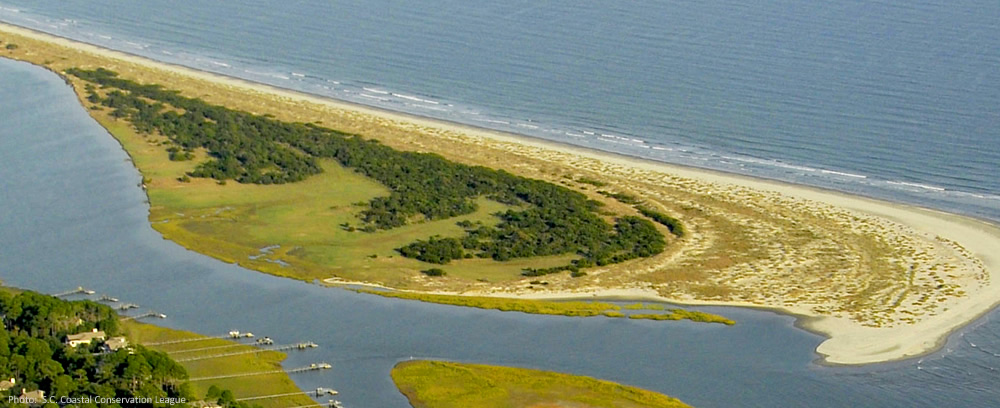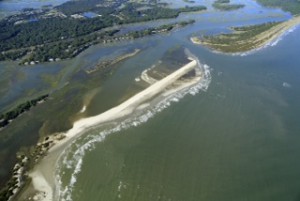By Katie Zimmerman, S.C. Coastal Conservation League | Captain Sams Spit is in the crosshairs of development again.
The Spit is a 150-acre pristine sandy land mass at the southern end of Kiawah Island, relied upon by the piping plover, diamondback terrapin, bottlenose dolphin, and other rare and threatened species for nesting and feeding.
For eight years, the Coastal Conservation League, represented by the South Carolina Environmental Law Project (SCELP), has challenged numerous permits issued to Kiawah Development Partners (KDP) and its affiliates. The first round of permits would have allowed construction of a half-mile long concrete wall in connection with KDP’s proposal to build a high-end residential development on the undeveloped, highly dynamic Spit. Just as the public felt relief with the state Supreme Court’s December 2014 ruling on this permit to be the final word — with the recognition that a pristine, active island and critically important public trust resource providing habitat to a variety of rare, threatened, and endangered species is not something to be sacrificed for the sole benefit of a private developer — KDP applied for a new round of permits.
This most recent attempt of KDP, which is based out of North Carolina and backed by the same New York hedge fund that manages some of the New York State retirement fund, refuses to accept that a spit of eroding sand cannot make them a quick buck. KDP sought permits for a new steel sheet pile wall, road and sewer and water lines in connection with the proposed development. While this new wall is in the dunes, as opposed to below the mean high water mark, the same legal standards of the Coastal Management Program apply, making it a distinction without a difference. In addition, according to experts, the wall will be exposed on the sandy shoreline in short order due to the erosion rates. Yet the state Department of Health and Environmental Control (DHEC) gave KDP a free pass by issuing the permits, despite the Supreme Court’s ruling.
On behalf of the Coastal Conservation League, SCELP appealed the permits in the Administrative Law Court. KDP asked Judge Ralph King Anderson III, to “lift the automatic stay” to allow construction of the steel wall along the banks of the Kiawah River. The “automatic stay” works to protect public resources and prevent degradation until an Administrative Law judge determines whether the permits were properly issued. Two weeks ago, Judge Anderson granted KDP’s request to lift the “automatic stay” and authorize construction of the steel sheet pile wall. There has been no hearing to determine whether the most recent permits were issued in compliance with the law, and as SCELP chief counsel Amy Armstrong has pointed out, “These new DHEC authorizations are contrary to the ruling of our state’s highest court and would result in imminent harm to Captain Sams Spit and the wildlife dependent upon it.” On behalf of the League, SCELP has requested the state Supreme Court to grant “extraordinary relief” and prevent construction on the Spit. We are waiting to hear the court’s decision.
KDP has shown that it is not only willing to sacrifice the Spit itself, but also the protections of our entire coastline. To that end, the developers have sought to amend a beachfront management bill in our state legislature this session, and actually managed to convince a senator from Berkeley County to defend its proposal (the “Kiawah Amendment”). The bill in question would set a permanent baseline along our entire coast, defending taxpayers, homeowners and natural resources from development too close to the ocean. The “Kiawah Amendment” would delay setting that baseline, allowing road and other construction to occur even closer to the ocean on Captain Sams Spit.
We plan to fight the “Kiawah Amendment” to the beachfront management bill as the legislative session continues, but we also plan to fight a bill being promoted by Myrtle Beach area developers and road boosters that would eliminate the automatic stay (referenced above) in its entirety. Their bill would have harmful implications for the environment, as in the case with Captain Sams Spit. The automatic stay is a legal mechanism that prevents irreversible damage to South Carolina’s special places when a permit that could cause harm is being appealed.
Development proposals like the one for Captain Sams Spit are completely inappropriate. Developers like KDP have demonstrated no deference to wild places that deserve protection. Make sure you stay involved with this issue and the legislative ones affecting it by signing up at this link.
Katie Zimmerman is program director of air, water and public health for the S.C. Coastal Conservation League.






 We Can Do Better, South Carolina!
We Can Do Better, South Carolina!
























